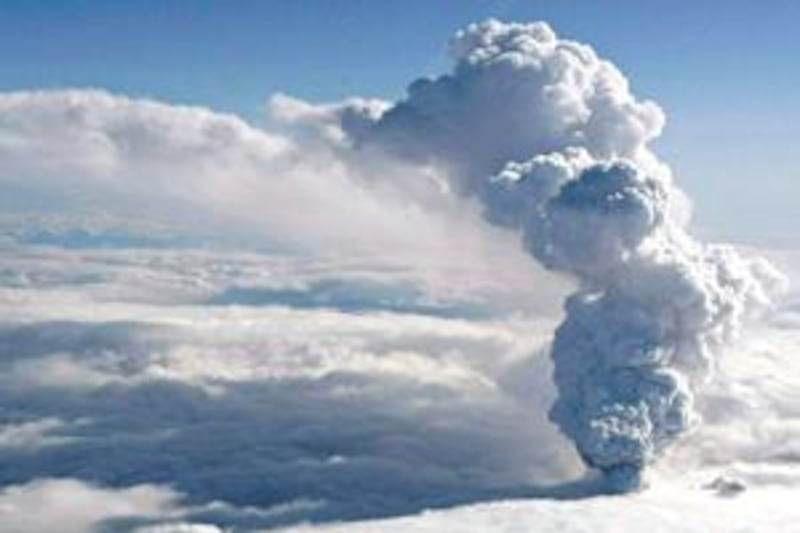LONDON // A massive cloud of volcanic ash billowing over north-west Europe reduced airline travel to chaos across much of the world yesterday. A huge swath of airspace was shut down across Britain, Ireland, France, Belgium, the Netherlands and Scandinavia, with almost 4,000 flights grounded and tens of thousands of passengers stranded.
For the first time in history, every airport in the UK - including Heathrow, the world's busiest international hub - was closed. They were not due to reopen until 6am GMT today at the earliest. A spokesman for Eurocontrol, the body responsible for European air safety, said airspace over Belgium and the Netherlands was closed from 5pm GMT yesterday while Sweden announced an indefinite shutdown from 8pm GMT.
Among the flights cancelled were all five of yesterday's Etihad Airways flights and six Emirates Airlines flights between Abu Dhabi and Dubai and the UK. Neither airline would say how many passengers were involved. A total of 60 flights to and from the UAE were affected, including transit stopovers. Some KLM passengers were stranded at Schipol airport in Amsterdam, on their way to the UK. Flights from Dubai and Abu Dhabi to the UK scheduled for early this morning are also expected to be cancelled.
The ash cloud billowed eastward after a volcano under the Eyjafjallajokull glacier in Iceland erupted 180km east of Reykjavik. Forecasters were tracking it last night amid fears that it could affect France, Germany and even Spain. The planes were grounded because ash particles from the cloud can be sucked into jet engines, initially melting and then solidifying again, causing engine failure. Britain's National Air Traffic Service (Nats) was the first to announce an airspace closure yesterday morning. Initially, all flights in or across UK airspace were grounded for six hours, until 5pm GMT last night. Later, the closure was extended until this morning.
Almost half of all commercial flights in and out of UK airports are at the two main London airports, Heathrow and Gatwick. Yesterday, there were due to have been about 1,300 flights and 180,000 passengers flying in and out of Heathrow, with another 679 flights carrying 80,000 passengers at Gatwick, according to the Civil Aviation Authority. Last night, the French civil aviation authority announced the phased closure of 24 airports in northern France, including Charles de Gaulle in Paris, which was due to be shut by 11pm local time. The aviation authority, the DGAC, could give no idea when the airports might reopen.
Forecasters said that the ash cloud could take between 24 and 36 hours to drift across the UK on winds currently coming from the north-west. The hope was that the cloud would thin as it was pushed across Europe. Brendan Jones, a forecaster with MeteoGroup, the weather arm of the Press Association, said: "At present the Icelandic eruption is not a big one, although we have to wait to see if there are further eruptions."
The concern last night was that the eruption could trigger a much larger explosion of nearby Mount Katla. A spokesman for Nats said: "The Volcanic Ash Advisory Centre has issued a forecast that the ash cloud from the volcanic eruption in Iceland will track over Europe tonight. "Nats is working with Eurocontrol and our colleagues in Europe's other air navigation service providers to take the appropriate action to ensure safety in accordance with international aviation policy."
Brian Flynn, assistant head of operations at Eurocontrol, told the BBC: "As it moves toward the Netherlands and Belgium it will dissipate and lose intensity, like any weather phenomenon. But we don't know what the extent of it will be." The UK Meteorological Office said that it feared that the ash, currently forming a cloud at about 15,000 metres, could take several days to clear. "It is showing up on imagery at the moment, extending down as far as the Faroes but it looks as though the wind will drag it a good deal further south," said a spokesman.
In addition to the UK, airspace was closed or flights cancelled in Republic of Ireland, Denmark, Norway, Sweden and Finland. Thomas Madsen, a spokesman for the Danish Meteorological Institute, said the ash cloud would probably continue to affect the Nordic countries until at least this morning. "The cloud can't be seen and it won't have an effect on people's health, but it will affect flight traffic," he said.
The British prime minister Gordon Brown defended the decision to shut down all airports, apologising to passengers but saying that safety was "the first and predominate consideration". Lord Mandelson, the UK's secretary of state for business, added: "Nobody in business or indeed the travelling public will welcome the decision to close down UK airspace, but the safety of people has to come first. That comes above every other consideration.
"It's inconvenient but when you have a volcanic dust cloud coming over the UK in this way, we have got to protect the travelling public." The disruption will cost airlines throughout the world millions of dollars in lost revenue and is most unwelcome to British Airways, which has already had to cope with substantial losses caused by two strikes this year by cabin crew. Paradoxically, one place unaffected by the airspace closures was Iceland itself, with the winds carrying the ash away from the island's Keflavik airport.
dsapsted@thenational.ae






